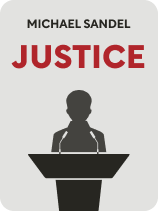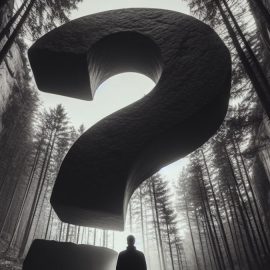

This article is an excerpt from the Shortform book guide to "Justice" by Michael Sandel. Shortform has the world's best summaries and analyses of books you should be reading.
Like this article? Sign up for a free trial here.
What is Michael Sandel’s Justice about? What is the key message to take away from the book?
Justice is Michael Sandel’s exploration of the philosophical perspectives on justice and morality. To this end, Sandel examines how philosophers throughout the ages have tackled political dilemmas with ethical implications, offering his own critiques along the way.
Below is a brief overview of Justice: What’s the Right Thing to Do? by Michael Sandel.
Part 1: Welfare Versus Freedom
In Justice: What’s the Right Thing to Do?, Sandel discusses the role of government by outlining a common topic of political debate: To what extent should government restrict personal freedoms to ensure public safety and well-being? He illustrates this debate by comparing two radically different ideologies:
- Utilitarianism, a philosophy that believes government should only concern itself with maximizing public welfare
- Libertarianism, a philosophy that believes government should only concern itself with maximizing personal freedoms
In Part 1 of our guide, we’ll explore Sandel’s description of these two philosophies and how their views apply to real-life political questions.
Maximizing Welfare: Utilitarianism
Sandel begins by discussing utilitarianism—a moral philosophy arguing that the morality of an action or choice depends on how much happiness or pain it creates. “Happiness” to utilitarians (which they call “utility”) means pleasure and the fulfillment of desires, while a lack of happiness means pain or deprivation of desires. Utilitarians argue that happiness and pain are the only ways we measure morality—morally good things make people happy, while morally bad things cause people pain. Therefore, utilitarianism states that the most moral choice in any given situation is always the choice that creates the most happiness for the most people possible.
To show how this applies to political questions, Sandel explores two important views that result from utilitarian thinking: that there are no guaranteed individual rights, and that we can measure happiness.
View #1: No Guaranteed Individual Rights
According to utilitarians, individuals don’t morally deserve guaranteed basic rights—things like a right to safety, freedom, or property. Instead, utilitarians only believe in giving these rights if doing so maximizes collective happiness. On the other hand, if harming an individual or depriving them of freedom maximizes collective happiness, then it’s morally justified.
For example, English philosopher and founder of utilitarianism Jeremy Bentham (1748-1832) argued that governments should round up homeless people and imprison them in labor camps. He claimed that this was moral because it would create more utility (a cheap labor force to lower the cost of goods, fewer homeless people on the streets, improving standards of living for the homeless) than it would pain (depriving homeless people of freedom).
View #2: People Can Measure Happiness
To understand how much happiness or pain an action creates (a crucial part of determining what’s most ethical), a utilitarian believes they can measure happiness on a consistent scale. Sandel explains two main perspectives on how to do this:
1) Quantitative method: Some utilitarians (including Bentham) value all pleasures equally in their measurements of happiness. This non-judgmental approach makes it easier to measure pleasure and pain—they just consider how many pleasures a decision will create rather than which pleasures are lesser or greater. For example, a quantitative method would value pleasure from viewing the Mona Lisa as equal to pleasure from viewing The Real Housewives of New Jersey.
2) Qualitative method: Other utilitarians like John Stuart Mill (1806-1873) argue for a hierarchy of pleasures instead of valuing them all equally. They suggest that general consensus can create this hierarchy—if people generally agree that one pleasure is better than another (focusing on what they actually like, not on what they think they should like), then society will value that pleasure more highly. For example, if people generally accept that they enjoy The Real Housewives of New Jersey more than the Mona Lisa or that it’s “better art,” then a qualitative scale would value Real Housewives above the Mona Lisa.
Maximizing Freedom: Libertarianism
Sandel then contrasts utilitarianism with a very different view: libertarianism, a political philosophy arguing that the goal of the state is to maximize personal freedom. This goal comes from the libertarian belief that people own themselves. While this might sound abstract, libertarians use it in practice to argue for two kinds of freedom:
- Personal freedom: People have the freedom to direct and impact their own lives however they see fit. This is essentially the same as being free to use your property however you like—since you own yourself, you can “use” yourself to live however you like.
- Economic freedom: People own their labor and whatever it creates. For example, if you own a lemon tree, you also own the lemons that it grows. Similarly, since you own yourself, you also own whatever you do and create.
Sandel further outlines these two forms of freedom, as well as how they influence political questions:
Personal Freedom
Sandel explains that to protect personal freedom, libertarians oppose two main kinds of laws:
1) Safety laws: Since everyone owns themselves, they have a right to take personal risks if they so choose. Libertarians argue that safety laws limit this freedom and are therefore unethical. Examples of these laws include the criminalization of potentially dangerous substances like heroin as well as more mundane rules like speed limits.
2) Moral laws: Since everyone owns themselves, they have a right to live according to their own moral code. Therefore, libertarians believe that laws enforcing one specific moral code are unethical. For example, libertarians object to laws against homosexuality or abortion—they believe people have a right to anti-gay or anti-abortion moral beliefs, but that it’s unethical to limit the freedom of those who hold different views.
Economic Freedom
Sandel says that to preserve personal ownership of labor and whatever it creates, libertarians also oppose most economic regulation. In particular, they argue against wealth redistribution—anything from higher taxes on the rich to a government-mandated minimum wage. Libertarians argue that wealth redistribution is essentially theft: the government forcibly taking money that people have a right to. Some even argue that wealth redistribution is the same as forced labor, since it involves the government forcefully taking the result of someone’s labor.
The Libertarian State
While libertarians believe that the state should maximize freedom, they do recognize that it’s the government’s role to prevent people from limiting the freedom of others. Therefore, the ideal libertarian state does need some laws and government structures. In particular, libertarians argue that the state must criminalize individual actions that limit the freedom of others, like theft or murder. It also should enforce contracts and punish fraud to ensure that people are free to use their property and labor in the way they intend.
Part 2: Reason Versus Virtue
The second dilemma Sandel discusses is whether the government should embrace one view of morality, or avoid enforcing any specific moral code. To explore this dilemma, he again looks at two opposing philosophies:
- Liberalism: a philosophy that deemphasizes moral questions in favor of reason and logic
- Aristotle’s political theory: a philosophy that considers moral questions crucial for politics
In this section, we’ll discuss Sandel’s description of these two philosophies, as well as how they might inform real-life political debates and decisions.
Maximizing Reason: Liberalism
First, Sandel describes liberalism and its emphasis on reason. This school of political philosophy developed during the Enlightenment (a period of rapid scientific and ideological change in 17th- and 18th-century Europe) and still strongly influences many of our political institutions today.
Sandel explains that liberalism tries to separate politics from people’s personal backgrounds, identities, and moral beliefs. Instead, liberals argue that people should use logic and reason to discuss politics, law, and justice. Much like libertarians (an offshoot of the liberal tradition), liberals argue in favor of a “value-neutral” state that avoids promoting any one moral code over another and leaves people free to live their lives as they see fit. To this end, liberalism supports freedom of speech, the separation of church and state, and universal laws that apply equally to everyone regardless of their identity, background, or beliefs.
Sandel discusses two philosophers to represent the classic and modern views of liberalism: 18th-century German philosopher Immanuel Kant and 20th-century American philosopher John Rawls.
Classic Liberalism: Kantianism
Kant’s moral and political views emphasize reason above all else. Sandel explains that according to Kant, actions aren’t moral unless you decide on them through purely rational deliberation. Kant argues that if you don’t make a choice entirely through reason, then you’re making it due to innate instincts and preferences—things you have no control over. Therefore, that choice wasn’t freely made.
For example, if you work at your job to make money for groceries and a place to live, then Kant argues your choice to work isn’t freely chosen and therefore isn’t a moral action—it’s not motivated by your purely rational view of what’s morally best, but rather by your self-preservation instinct to seek food and shelter.
Kant explains that to freely make a moral choice, you must dutifully and unconditionally obey a moral law that you create for yourself. Or, to put it more simply, you must do what’s moral only because it’s the moral thing to do and not for any other reason.
Kant argues that to be entirely rational, moral laws must meet two standards (called the “categorical imperative”):
1) Moral laws must work universally. To test if a moral law derives entirely from reason, consider how it would function if everyone followed it. If it doesn’t work universally, then it’s based at least partially on personal preference rather than entirely on reason. For example, John is furious at his annoying neighbor and thinks, “I should hurt people who disrespect me.” However, if everyone dutifully followed that law, there would be massive and perpetual cycles of violence. Therefore, John’s law is based on preference and isn’t moral.
2) Moral laws can’t use rational beings as a means to an end. As previously explained, a moral law that you follow for its own sake has inherent value—you follow it because it’s the morally right thing to do, not because it gets you something else. Kant argues that human life is the same way: Rational humans live life for its own sake and not for some other external goal. And since we live just to be alive, then living must have inherent value. Therefore, Kant believes that moral laws must respect the inherent value of human life. This means recognizing that human life is an end in itself and not using others (or ourselves) as a means to an end.
For example, John wants to punch his annoying neighbor. However, if he did that he’d be using his neighbor as a means to the end of getting out his anger and feeling better about himself. Therefore, according to the categorical imperative, John punching his neighbor is immoral.
Modern Liberalism: Rawlsianism
For a more contemporary example of liberalism, Sandel discusses 20th-century American philosopher John Rawls. While Rawls has the same goal as Kant—defining justice entirely through reason—he approaches it in a different way. Instead of appealing to universal moral laws, Rawls focuses entirely on how a group of equally competent and entirely rational individuals would organize society. This organization would determine the distribution of benefits (wealth, political power, rights) and obligations (laws, expectations). Essentially, Rawls tries to define justice in a way that he says any rational and self-interested person could agree with.
To that end, Rawls creates a thought experiment he calls “the original position.” In the original position, everyone comes together as rational, self-interested equals to debate the definition of justice until they find one that everyone agrees with. In this hypothetical, people don’t know the specific circumstances of their lives—things like wealth, religion, race, sexuality, and so on. This means people will argue for terms that apply fairly to everyone regardless of their circumstances. For example, in the original position, Tom doesn’t know how wealthy he is. Therefore, he won’t argue for terms that benefit the rich at the expense of the poor—for all he knows, he’s poor (or could become poor).
Rawls suggests that the original position results in two terms (or something similar to them):
- Everyone has guaranteed basic individual rights.
- Inequalities of power and money can exist, but only when they benefit the less fortunate (and the least fortunate most of all).
Term one ensures that nobody will be oppressed or denied freedoms for the benefit of others. Term two ensures that people can get ahead socially or economically, but not at the expense of leaving other people behind to suffer. Much like Kant, Rawls’s rules are universal—he believes that they can justly resolve any political question.
Maximizing Virtue: Aristotle’s Political Theory
Sandel contrasts liberalism with the political theory of Aristotle, the 4th-century BC Athenian philosopher. Unlike liberal philosophers, Aristotle believes that we cannot and should not separate politics from questions of morality and personal life circumstances. To demonstrate why this is the case, Sandel focuses on two main themes of Aristotle’s viewpoint:
Theme #1: Teleology and Justice
Aristotle has a “teleological” view of the world—in other words, he believes that everything has an end goal or purpose (a telos in ancient Greek). Sandel explains that Aristotle uses this view to explain politics as a whole as well as the relationship between politics and individuals:
1) The telos of politics, according to Aristotle, is to create laws and a society that help people live satisfying and virtuous lives. While liberalism looks to give people the opportunity and freedom to live well and be moral if they so choose, Aristotle believes that there shouldn’t be a choice.
2) But the definition of “living well” varies depending on the person, explains Aristotle—different kinds of people have their own different telos (purposes in life) and require different things to achieve them.
For example, imagine someone who’s directionless and can’t function in society on their own. To Aristotle, this person would have the telos of obedience—for them to flourish and live the best possible life, they’d need direction, supervision, and help from a superior. Aristotle says that in this case, enslaving this person is moral—it helps both the enslaved person and the enslaver. However, if the enslaved person rejected their status or tried to escape, then Aristotle says they should go free, since their rejection shows that they don’t have the telos of being enslaved.
Theme #2: Leaders With Merit
The second crucial part of Aristotle’s political theory that Sandel discusses has to do with merit and “desert” (a philosophical term meaning “being deserving of something”). These are the main guidelines Aristotle uses for distributing social goods like rights, wealth, and political power. He reasons that society should give goods to the people who can use them best—for example, the best tools to the best carpenter, or the most land to the best farmers. Since Aristotle considers politics as the application of virtue, he concludes that the most virtuous people should hold power. This ties in with the telos of politics: Since the goal of politics is to make people live virtuously, it follows that a virtuous person is best suited to this task.
To Aristotle, this all takes place in the context of a community as a whole—the best farmer wouldn’t get the most land just so they could grow their personal wealth. Instead, said farmer would use their skill to grow food for everyone in the community.
Part 3: How to Move Forward
Sandel closes the book with his own conception of justice and how he thinks it can create a more moral world. He advocates a version of communitarianism (a philosophy arguing that the goal of the state is to create and preserve a community of citizens) that promotes public engagement, kinship among citizens, and the sense that they’re part of a larger project. In this section, we’ll explore the benefits of Sandel’s approach, as well as some practical examples he suggests for implementing it.
Benefits of Communitarianism
Sandel argues that his version of communitarianism combines the best parts of the philosophies he discusses while avoiding the morally concerning portions:
Utilitarianism: Sandel’s view shares the utilitarian concern for the overall public good by focusing on serving the community as a whole. Unlike utilitarianism, however, Sandel’s philosophy sees individuals as inherently valuable community members regardless of pleasures or pains.
Libertarianism: Similar to libertarians, Sandel appreciates the benefits of the free market as a tool for organizing and creating wealth. He also believes that the state should, to a degree, respect personal freedoms. However, Sandel doesn’t argue for complete deregulation of these areas—instead, he argues that the state should manage and regulate personal conduct and the market to make sure they serve the community as a whole.
Liberalism: Much like liberal philosophers, Sandel argues for a baseline level of decency, respect, and personal rights for all human beings. However, he disagrees with the liberal view that those baseline moral obligations derive only from reason. He argues that people also have moral obligations to their loved ones and communities. Sandel also disagrees with the liberal view that governments should avoid questions of morality—he says people must debate these questions to determine their community’s goals and differences.
Aristotle’s political theory: Sandel agrees that the state should help people live fulfilling and virtuous lives. However, unlike Aristotle, he’s against forcing people into certain roles and distributing social goods based on merit and moral “desert.” Instead, Sandel believes that the state should instill values of kinship, solidarity, and civic participation so everyone can freely debate over the best, most moral way to live and distribute social goods.
Practical Examples: Communitarian Projects
To show how communitarianism works in practice, Sandel offers examples of how governments can create and preserve a community of citizens:
1) Regulate markets: While Sandel doesn’t believe in abolishing free-market capitalism, he does suggest that governments thoroughly regulate markets. Under an unregulated market, people judge things in terms of monetary value or profitability rather than moral value or value to the community. Sandel argues that regulation, on the other hand, can prevent free-market capitalism from replacing community values and traditions with whatever is most profitable. This combines the free market ideals of libertarianism with Aristotle’s concern for preserving and encouraging the morality of citizens.
2) Address inequality: Sandel warns that growing inequality damages communities. Increased inequality means people from different classes and backgrounds interact less—the rich have enough money to cut themselves off from everyone else. When the wealthy self-segregate, their taxes don’t contribute to public services in poorer places. These public services (things like schools, parks, and community centers) are crucial not only for improving poor people’s lives but also for helping different kinds of people mingle and strengthen their sense of community. This echoes Rawls’s liberalism—specifically the idea that economic inequality is just so long as it services the community as a whole (in this case, through taxes that fund public services).
3) Encourage public participation: Sandel also suggests that governments encourage (through monetary incentives) or require acts of public participation like volunteering, community service, or political participation. Public participation means anything from government-created public works projects to campaigns encouraging people to organize politically. These efforts will not only get people interacting with other members of their community, but they’ll also encourage people to help each other and join in the larger project of being a citizen. This idea resonates with utilitarian thought by encouraging (or requiring) citizens to work toward maximizing well-being for as many people as possible via public projects.

———End of Preview———
Like what you just read? Read the rest of the world's best book summary and analysis of Michael Sandel's "Justice" at Shortform.
Here's what you'll find in our full Justice summary:
- A philosophical look at the goal of our society and its laws
- What a moral and just government and society look like
- Sandel's suggestions for how to create a more moral world






